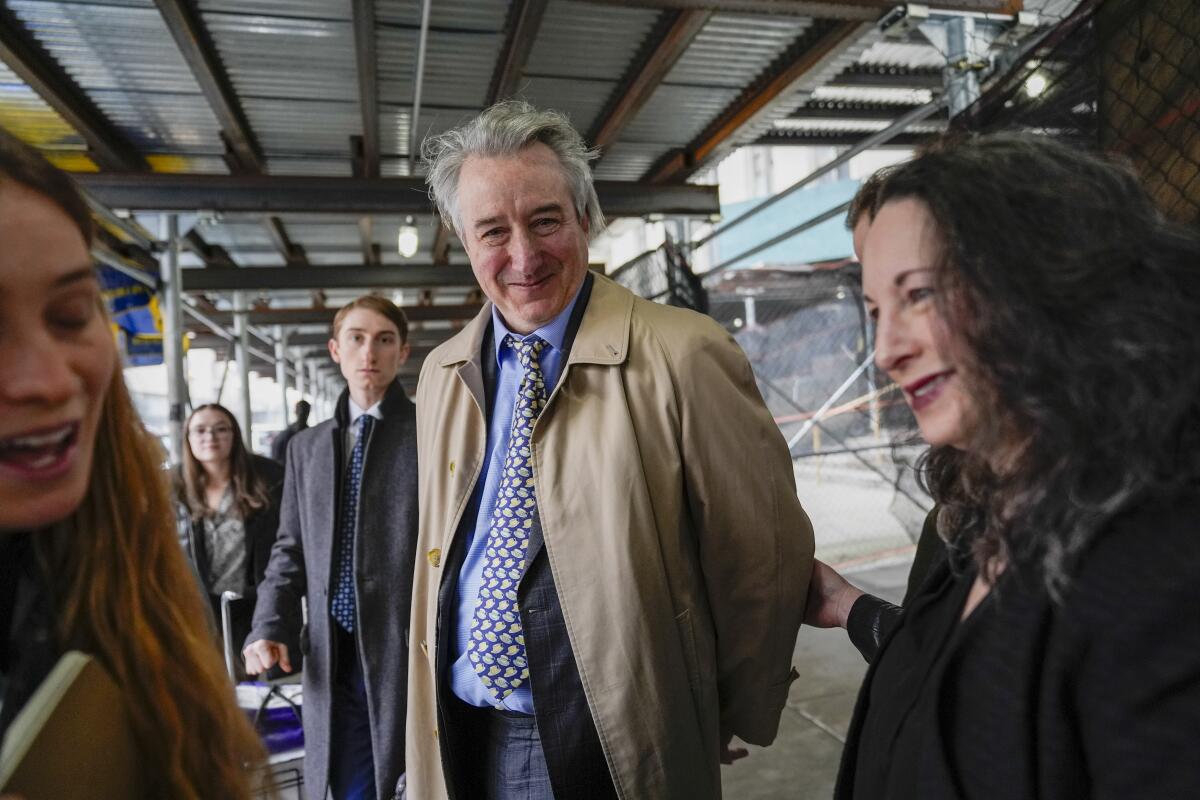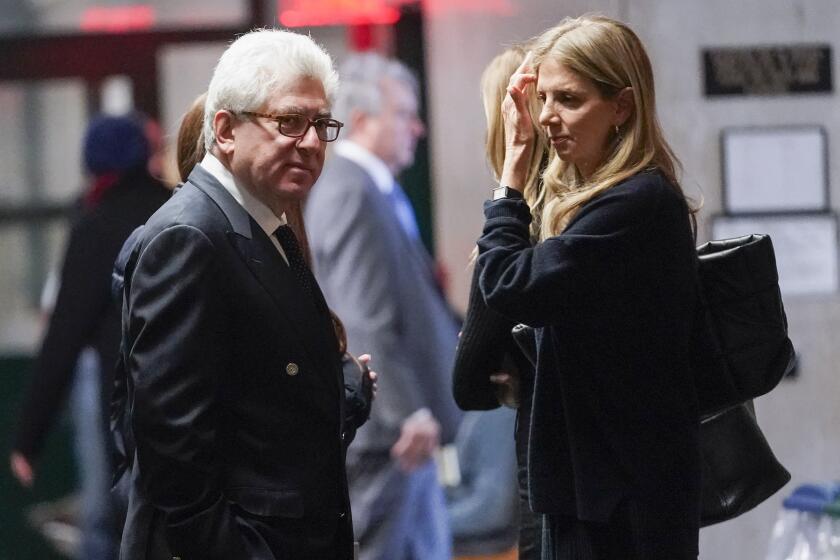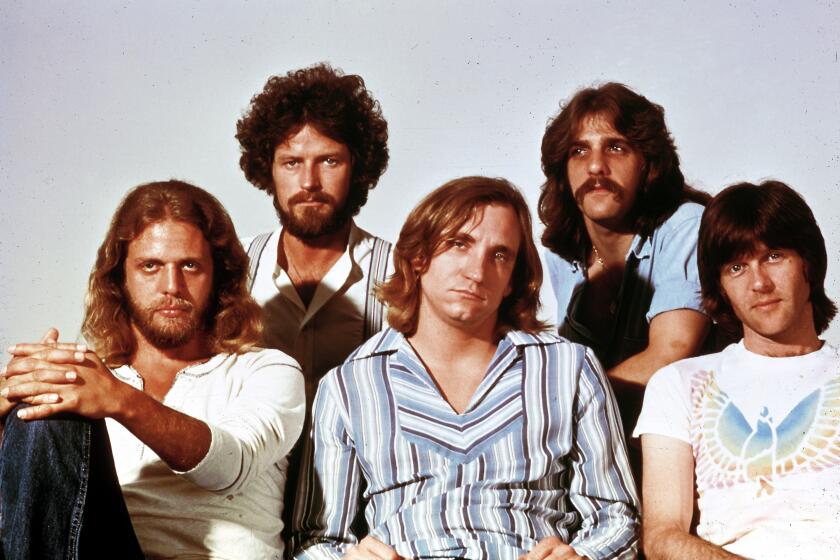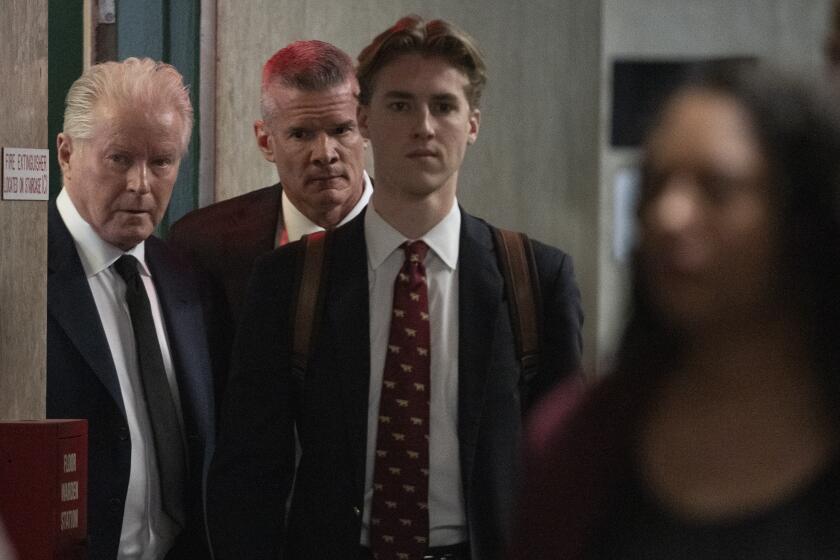Charges are dropped midtrial in ‘Hotel California’ lyrics case. Don Henley plans to fight on

- Share via
NEW YORK — From the start, the case was highly unusual: a criminal prosecution centered on the disputed ownership of a cache of hand-drafted lyrics to “Hotel California” and other Eagles hits.
Its end was even more unexpected.
In the middle of the trial, New York prosecutors abruptly dropped their case Wednesday against three collectibles experts who had been accused of conspiring to hang onto and peddle the pages, which Eagles co-founder Don Henley maintained were stolen, private artifacts of the band’s creative process.
In explaining the stunning turnabout, prosecutors agreed that defense lawyers had essentially been blindsided in recent days by getting 6,000 pages of communications involving Henley and his attorneys and associates. The material was provided to both sides only in the last few days, after Henley and his lawyers apparently made a late-in-the-game decision to waive their attorney-client privilege to keep legal discussions confidential.
A criminal trial over handwritten lyrics to the classic rock megahit ‘Hotel California’ and other Eagles favorites begins in New York.
“These delayed disclosures revealed relevant information that the defense should have had the opportunity to explore” when Henley and other prosecution witnesses were on the stand, Assistant Manhattan Dist. Atty. Aaron Ginandes told the court.
With that, rare books dealer Glenn Horowitz, former Rock & Roll Hall of Fame curator Craig Inciardi and rock memorabilia seller Edward Kosinski were cleared of all the charges, which had included conspiracy to criminally possess stolen property.
The case centered on roughly 100 pages of legal-pad pages from the creation of a classic rock colossus. The 1976 album “Hotel California” ranks as the third-biggest seller of all time in the U.S., in no small part on the strength of its evocative, smoothly unsettling title track about a place where “you can check out any time you like, but you can never leave.”
Prosecutors had said the defendants knew the pages had a dubious chain of ownership but sought to keep and sell them anyway, scheming to fabricate a provenance that would pass muster with auction houses and stave off Henley’s demands for the return of the documents.
In July, three men were indicted in an attempt to sell the manuscripts, stolen property belonging to the Eagles’ leader. But the story begins in the ’70s with a shelved biography.
Through their lawyers, the defendants contended they were rightful owners of pages that weren’t stolen by anyone.
“The next step is building back our reputations,” Inciardi said in a written statement after the dismissal. Kosinski, leaving court, said only that he felt “very good” about the case’s end.
Horowitz hugged tearful family members, then left court without commenting. One of his lawyers, Jonathan Bach, said the case “should never have been brought.”
A lawyer for Henley, meanwhile, signaled that he isn’t done with the matter.
“As the victim in this case, Mr. Henley has once again been victimized by this unjust outcome,” attorney Dan Petrocelli said in a statement. “He will pursue all his rights in the civil courts.”
One of Kosinski’s lawyers, Scott Edelman, said they also were going to “evaluate next steps.”
Don Henley of the Eagles testifies about a 1980 arrest as he takes the stand at trial over what the musician says are stolen draft lyrics to ‘Hotel California.’
“The district attorney in this case got blinded by the fame and fortune of a celebrity,” Edelman said outside court, “and that blinded them to the information that they weren’t being given.”
In formally dismissing the case, Judge Curtis Farber said the prosecutors “were apparently manipulated.” Without naming names, he said witnesses and their lawyers used attorney-client privilege “to obfuscate and hide information that they believed would be damaging.” The communications that led to the case dismissal weren’t released publicly.
The defense maintained that Henley gave the lyrics pages decades ago to a writer who worked on a never-published Eagles biography and later sold the handwritten sheets to Horowitz. He, in turn, sold them to Inciardi and Kosinski, who started putting some of the pages up for auction in 2012.
Henley, who realized they were missing only when they showed up for sale, reported them stolen. He testified at the trial that he let the writer pore through the documents for research but “never gifted them or gave them to anybody to keep or sell.”
The writer wasn’t charged with any crime and hasn’t taken the stand. He hasn’t responded to messages about the trial.
More to Read
Sign up for Essential California
The most important California stories and recommendations in your inbox every morning.
You may occasionally receive promotional content from the Los Angeles Times.















